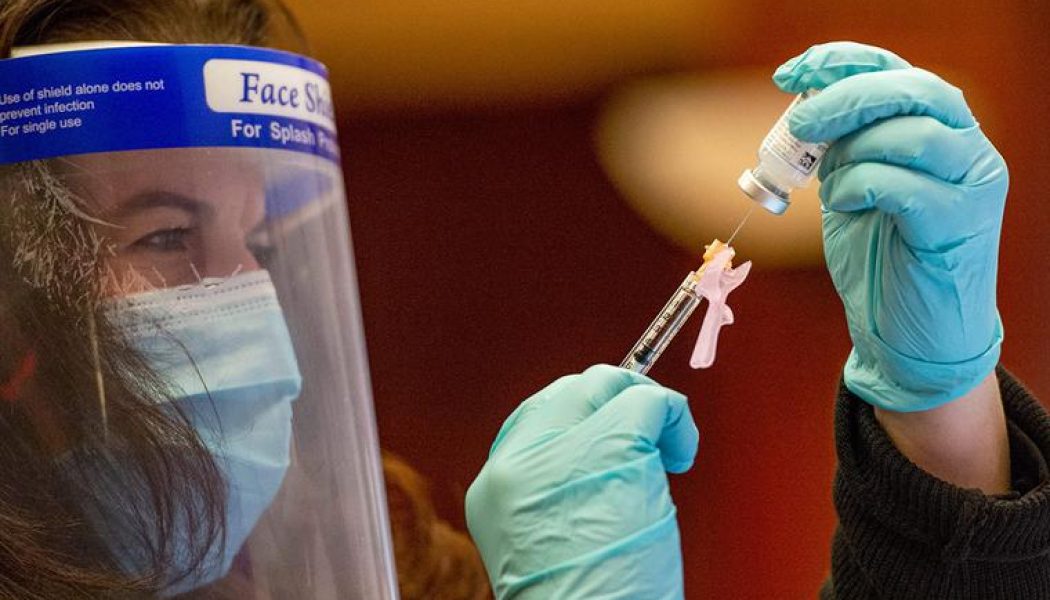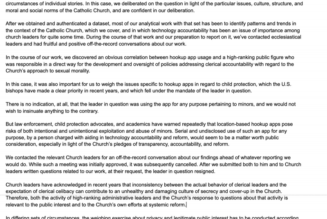
COMMENTARY: The Pontifical Academy for Life has said that Catholics may use, in a narrowly defined limit, vaccines prepared with cell lines derived from aborted children, but with strong warnings regarding our obligation to protest. Here’s how to demand ethical options in biomedical research.
The 2005 guidance from the Pontifical Academy for Life (PAL), “Moral Reflections on Vaccines Prepared From Cells Derived From Aborted Human Fetuses,” told us to end the practice of using abortion-tainted vaccines and demand ethical alternatives. These same principles are reaffirmed in the new statement the Congregation for the Doctrine of the Faith has released regarding the new COVID-19 vaccines that are now becoming available.
But, as the COVID-19 pandemic and response has shown, the issue is still very much unsettled, both in the pharmaceutical industry and in the ethical considerations among Catholics. How do we object to an abortion-tainted vaccine if for grave reason we accept the shot?
The Vatican provided guidance that still applies today. The PAL 2005 document explained that Catholics may use, in a narrowly defined limit, vaccines prepared with cell lines derived from aborted children, but with strong admonishments regarding our obligations to protest. As we exercise prudential judgment about our vaccine choices, it is a good time to review our obligations.
Abstain. The Pontifical Academy for Life says it is “right to abstain” if refusal to use the vaccine can be done without causing harm to yourself or community. If you judge that you can go without the vaccine, you should do so, even if it means continuing to adopt social-distancing measures to keep those around you safe. This honors the safety of others while respecting the dignity of unborn human life. By making this choice, you are showing that you are willing to sacrifice personal comfort to reject a vaccine produced using the remains of an aborted child.
Use alternatives. The Pontifical Academy for Life says that there is a “grave responsibility to use alternative vaccines,” meaning the decision to use a morally tainted vaccine cannot be made lightly. A COVID-19 vaccine that was produced using the remains of an aborted child should only be used if there are no other options available and the risk of not using it is grave. For example, an at-risk person may judge he cannot wait for ethical options to make it to the market. A health-care worker with a family who depends on her may judge that it is best to do as her workplace requires. Make sure to find out what your options are, including waiting for the ethically produced vaccines to be available.
Use is only temporary. The Pontifical Academy for Life says we have a “moral duty” to continue to fight and to “employ every lawful means in order to make life difficult for the pharmaceutical industries which act unscrupulously and unethically.” This is no less true for the COVID-19 vaccine than for childhood vaccines such as those for rubella or chickenpox. Until now, this battle tended to be generational. Once a family’s children have grown past the vaccination ages, parents move on to other issues. With COVID-19, a lot of adults heard about the connection between aborted children and vaccines for the first time. It’s good to be reminded that even if we use the vaccine now because we cannot abstain and we have no alternative, we all must keep demanding ethical practices in biomedical research. Had we done so with greater intensity over the last 50 years, we might not be in the situation of having to accept any tainted COVID-19 vaccines.
Protest with every lawful means. Whether we use the vaccine or not, we are to “make life difficult” for pharmaceutical industries who continue to use abortion-tainted cell lines in research and production. Here are a few suggestions.
- Email the company (Moderna, Pfizer, AstraZeneca, Johnson & Johnson): “If you stop using the remains of aborted children in all research and production, your product will gain the Christian market.” Companies can change their practices, just as Sanofi Pasteur did earlier this year, when it committed to discontinuing the use of aborted fetal cell lines in its polio vaccines. Don’t let people tell you it cannot be done; it can. But the market must demand it. Of course, it would be great if the Christian market — especially the 70 million Catholics in the United States — would back that statement up by abstaining, using alternatives and continuing to demand ethical medicines.
- Contact your representatives and senators. “I object to the use of the remains of aborted children in vaccines or any other biomedical product, and I will back this up with my vote and my money.” It’s okay to be a nag.
- Create social-media chatter. Discussion threads and memes can influence opinions and motivate action very quickly. Given the emotions involved with this topic, please ensure that contributions are responsible, factual, respectful and constructive.
- Share this with your priest or bishop. Many people were upset by the USCCB’s recent statement approving the use of the new COVID-19 vaccines with a moral calculus that came across as out of touch with the serious ethical concerns over the abortion connections, but we are all trying to get through this time together. Help move the conversation forward.
- Learn about ways to help organizations committed to ethical biomedical standards that value the sanctity of human life, such as the John Paul II Medical Research Institute.
- If you are skilled in business negotiations, organize a meeting with these pharmaceutical companies and invite your priest or bishop to accompany you. This should not be done lightly, of course, but using professional talents to make a compelling economic and moral case to a marketing manager at a pharmaceutical company might just work. After all, 70 million Catholics in the U.S. equals 22% of the world’s largest pharmaceutical market.
- Submit a comment or request to speak at the Food and Drug Administration (FDA) Vaccines and Related Biological Products Advisory Committee meeting. Before every meeting, an announcement is made with information for the public about how to participate. Ask them to require pharmaceutical companies to disclose any use of aborted fetal cell lines.
- Request to make an oral statement at the Centers for Disease Control (CDC) Advisory Committee on Immunization Practices. Request that accommodations be made for people who object to abortion, as options untainted by abortion would encourage more people to accept vaccinations.
Seek truth in scientific information. Information is coming fast, and there has already been confusing terminology to describe the research, development, testing and production. The Charlotte Lozier Institute (CLI) listed the Moderna and Pfizer mRNA vaccines as “ethically uncontroversial,” although the National Catholic Bioethics Center (NCBC) and Children of God for Life both disagreed, due to the use of the HEK293 aborted fetal cell line in research and lab testing.
The Charlotte Lozier Institute then coined the phrase “confirmatory testing,” which was interpreted to indicate that the HEK293 cells were only used in a onetime test, making the vaccine seem more ethical than vaccines grown in fetal cell lines continuously. However, this is only speculation. Although the USCCB and many other Catholic organizations have unfortunately repeated this undefined, unsupported and unexplained phrase as the reason the Moderna and Pfizer vaccines are ethically uncontroversial, the details of quality-control testing are not yet known. To emphasize: We do not yet know.
The preclinical trials for both vaccine manufacturers (Moderna, Pfizer) indicate that they use HEK293 for in vitro testing. Researchers incubate the mRNA vaccine in the fetal cells to see if they express the spike protein as they should. It seems entirely possible that the same in vitrotest would be used in ongoing production for quality control, rendering the Moderna, Pfizer, AstraZeneca, and Johnson & Johnson (the latter two are grown in fetal cell lines) vaccines equally unethical, since fetal cell lines are used in ongoing production. Quality-control testing is not ancillary to production; it is an essential function required for approval by the FDA in the manufacturing process, accounting for a large part, if not the majority, of the time. Until the details of quality-control testing are known, we cannot dismiss the mRNA vaccines as ethically unproblematic.
An updated list of COVID-19 vaccines and the use of fetal cell lines is maintained at Children of God for Life. Links to scientific papers and supporting evidence are provided.
Do not forget the humanity of the unborn. As Catholic scholars continue to reassess the teachings of the Church and apply doctrine to the COVID-19 situation, there is a temptation to an excess of moral calculus and abstract reasoning. Remember, HEK293 was a child, not just the 293rd experiment to produce a human embryonic kidney cell line, but a child who deserved to be loved and named, a child who was unwanted and killed by a procedure that is still legal in our country. This practice of using aborted children in research — babies, dissected as if they are lab rats — continues today more than ever because our government, universities and industries fund and exalt it. Our society has become too comfortable with this evil practice. We should not decide to use a vaccine produced using cells derived from an aborted child unless we have no other choice.
In 2005, we were charged by the Pontifical Academy for Life with ending this unjust alternative choice, and maybe now we finally can because so many more people are informed. Please do not become complacent. Pray for clarity and courage. Practice supernatural prudence. Work to bring something good out of this dark time. Choose life pervasively.
Join Our Telegram Group : Salvation & Prosperity








